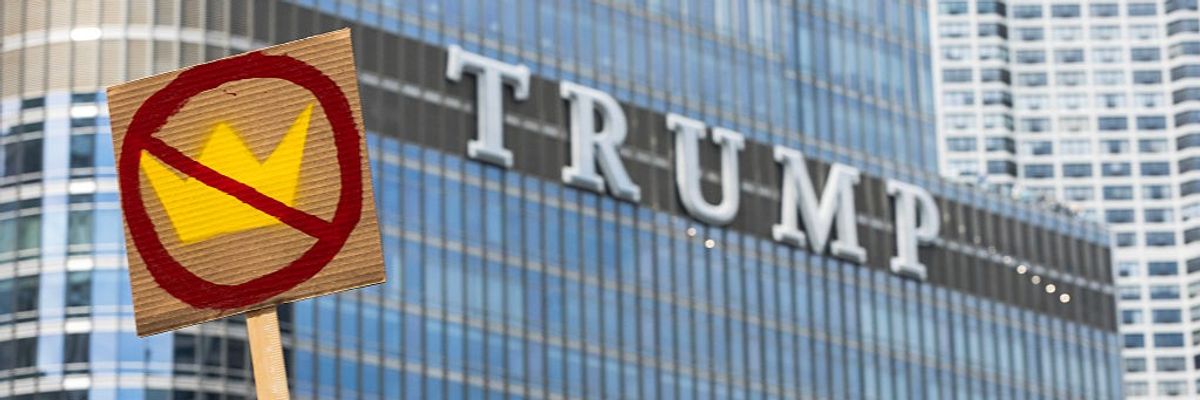US President Donald Trump said Friday that Chicago is the next city in his crosshairs for the kind of federal invasion and occupation currently underway in Washington, DC—a threat that sparked defiant pushback from officials in the Windy City and beyond.
"After we do this, we'll go to another location, and we'll make it safe also," Trump told reporters in the Oval Office, referring to his federalization of Washington's Metropolitan Police Department and deployment of National Guard troops from the district and five Republican-controlled states.
"We're going to make our cities very, very safe. Chicago's a mess. You have an incompetent mayor. Grossly incompetent and we'll straighten that one out probably next," the president said, referring to progressive Brandon Johnson. "That will be our next one after this. And it won't even be tough."
On August 11, Trump dubiously declared a public safety emergency in Washington, DC, despite violent crime being down 26% from a year ago, when it was at its second-lowest level since 1966, according to official statistics. Critics have noted that Trump's crackdown isn't just targeting criminals, but also unhoused and mentally ill people, who have had their homes destroyed and property taken.
On Friday, Trump threatened to completely take over Washington and oust Mayor Muriel Bowser if she does not stop pointing out that crime has decreased in the city, which the president called a "crime-infested rat hole."
In addition to Chicago, Trump has threatened to send federal forces into cities including Baltimore, Los Angeles, New York, Oakland, and San Francisco. Violent crime is trending downward in all of those cities—with some registering historically low levels.
Unlike in Washington, DC, where home rule laws allow the federal government to take control of local police, Trump would face greater obstacles to intervention in other cities.
"President Trump can't seize control of the Chicago police or any other local department outside of DC," Congressman Raja Krishnamoorthi (D-Ill.) noted on social media Friday. "The military cannot and will not patrol the streets of Chicago, and I will work with state and local officials to ensure that doesn't happen."
Mayor Johnson said in a statement that "the problem with the president's approach is that it is uncoordinated, uncalled for, and unsound."
"If the Trump administration is serious about driving down violence in Chicago, or anywhere else in America, then he should not have taken over $800 million away from violence prevention," he added.
Other elected officials in Illinois also expressed anger and alarm at the prospect of a Trump intervention in Chicago.
"After using Los Angeles and Washington, DC as his testing ground for authoritarian overreach, Trump is now openly flirting with the idea of taking over other states and cities," Democratic Illinois Gov. JB Pritzker said on X.
"Trump's goal is to incite fear in our communities and destabilize existing public safety efforts—all to create a justification to further abuse his power," the governor continued. "He's playing a game and creating a spectacle for the press to play along with."
"We don't play those games," Pritzker added. "Our commitment to law and order is delivering results. Crime rates are improving. Homicides are down by more than 30% in Chicago in the last year alone. Our progress in lowering crime has been made possible with [community violence intervention] programs that they’re defunding."
Lt. Gov. Juliana Stratton, a Democrat running for US Senate, said that "if Trump wants to take his ego trip on tour, he picked the wrong city."
"Chicago doesn't bow down to kings or roll out the red carpet for dictators," she added. "As a Black woman from the South Side, I can assure you... your political circus isn't welcome here."
Congresswoman Robin Kelly (D-Ill.) wrote on social media, "President Trump: You are not welcome in Chicago."
"Sending the National Guard endangers Black communities already overpoliced and under-invested in," she added. "If you cared about saving lives, you'd pass gun safety laws and fund community violence intervention."




